InvasIC Colloquium, October 6-7, 2022, Erlangen:
More than twelve years of collaborative research on Invasive Computing will find a celebratory ending. On this occasion, researchers, reviewers, experts and alumni met for the InvasIC Colloquium.
Events 2022
Rehearsal InvasIC Colloquium, September 6-7, 2022, Erlangen:
Researchers from all projects met at FAU, Erlangen to prepare the InvasIC Colloquium.
Semi-Annual Meeting 2022, May 5-6, 2022, Kupferzell-Beltersrot:
Once again our researchers met for the semi-annual meeting to discuss further research progress. The semi-annual meeting took place at Landhotel Beck in Kupferzell-Beltersrot.
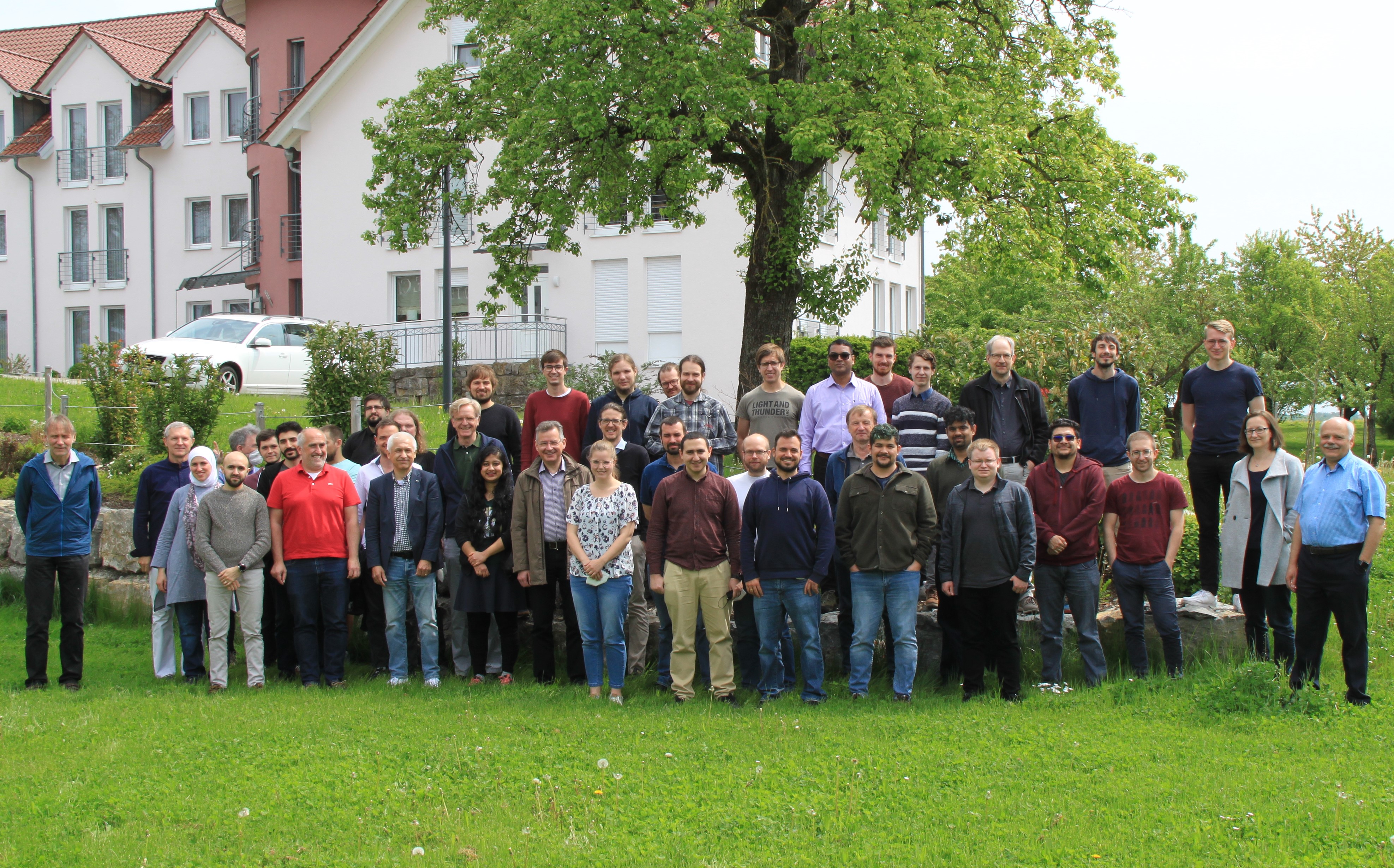
InvasIC members at the annual meeting 2022.
Doctoral Researcher Retreat, March 7-9, 2022, Virtual Meeting:
Our doctoral researchers met online to discuss progress and further research tasks. The focus was set on the integration and test runs of the global demonstrators.
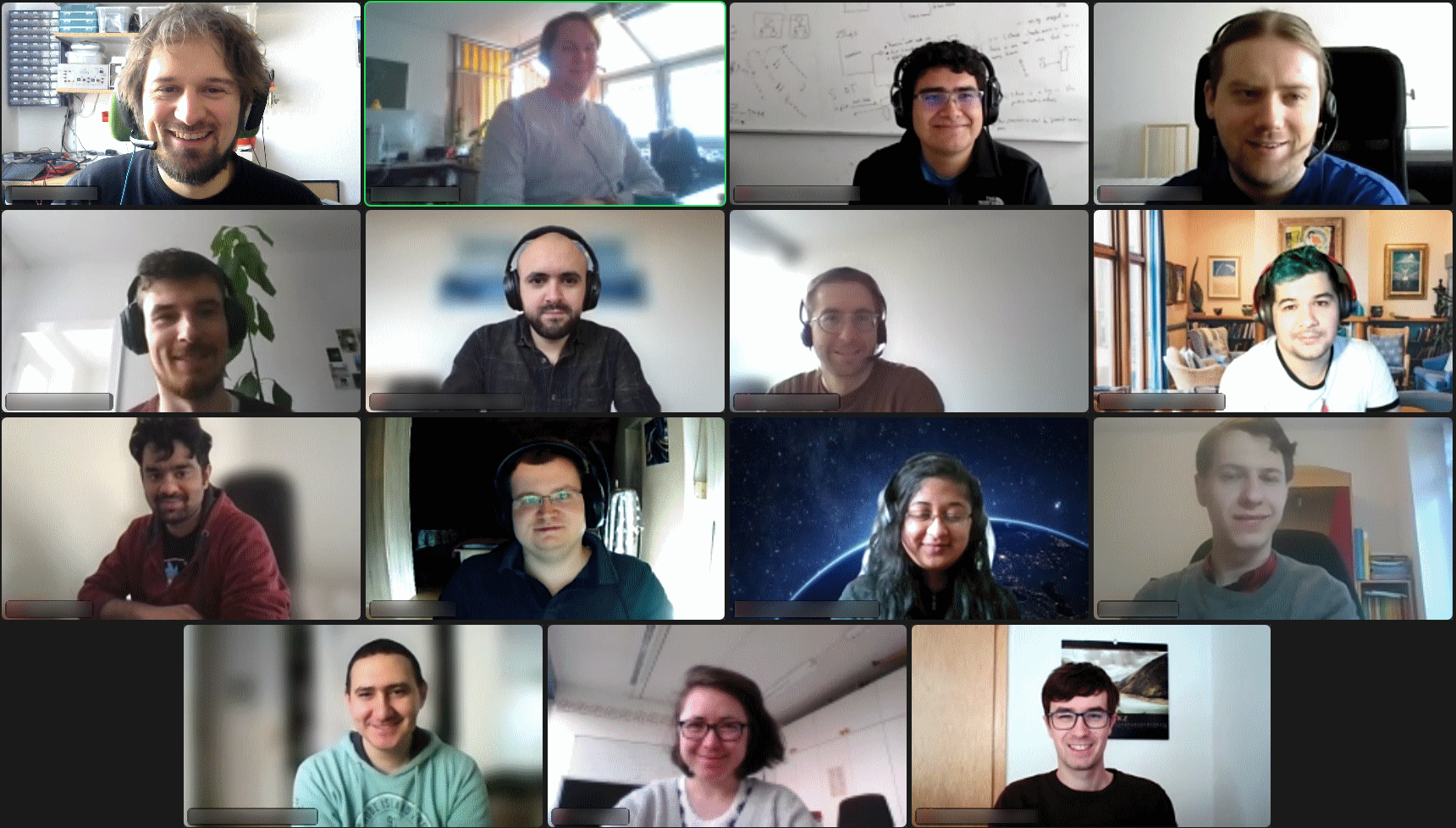
Our doctoral researchers at the Doctoral Researcher Retreat 2022, online edition.
Meeting on ProFPGA demonstrator (GD-1), February 17, 2022, Virtual Meeting:
Our researchers met online to synchronize on the current status and plan the next steps for the ProFPGA demonstrator (GD-1).
Events 2021
Annual Meeting 2021, October 4-5, 2021, Bad Mergentheim:
Finally, after a long time, our researchers reunited again in person for the annual meeting. The annual meeting took place at Hotel Bundschu (Bad Mergentheim) following the current COVID-19 regulations.
InvasIC members at the annual meeting 2021.
Doctoral Researcher Retreat, October 5-8, 2021, Bad Mergentheim:
Subsequently, to the annual meeting, our doctoral researchers met to discuss progress and further research tasks.
Meeting on ProFPGA demonstrator (GD-1), June 11, 2021, Virtual Meeting:
Our researchers met online to synchronize on the current status and plan the next steps for the ProFPGA demonstrator (GD-1).
Working Group Meeting on Runtime Requirement Monitoring & Enforcement (WG1), March 25, 2021, Virtual Meeting:
Partha Roop (University of Auckland): Cyber-Physical Systems Security: A Pacemaker Case Study
The WG1-working group met online to advance the research process. Partha Roop from the University of Auckland gave a talk as part of the virtual meeting. He talked about his recent research focus, which is cyber-physical attacks (CP attacks), originating in cyber space.
Doctoral Researcher Retreat, March 17-19, 2021, Virtual Meeting:
Doctoral researchers met online from March 17-19 to discuss progress and further research tasks.
Semi-Annual Meeting 2021, March 15-16, 2021, Virtual Meeting:
All researchers from the Transregional Collaborative Research Center Invasive Computing met online for the semi-annual meeting.

InvasIC members at the semi-annual meeting 2021.
Invasic Enforcement Demonstrator Meeting, February 23, 2021, Virtual Meeting:
In the follow-up meeting for the "Runtime Enforcement Demonstrator" the researchers narrowed down what should be presented on the demonstrator. This also included which applications could or should run on it.
Events 2020
Working Group Meeting on Memory Models, Architecture and Management (WG2), December 17, 2020, Virtual Meeting:
The meeting took place online from 2 PM to 5 PM. During the productive meeting, the progress of various WG2 topics was discussed.
Doctoral Researcher Retreat 2020, October 7-9, 2020, Web conference:
Our doctoral researchers met online from October 7-9, 2020. In addition to the main meeting, they split up into smaller working groups to discuss the research work, particularly about demonstrators in more detail.
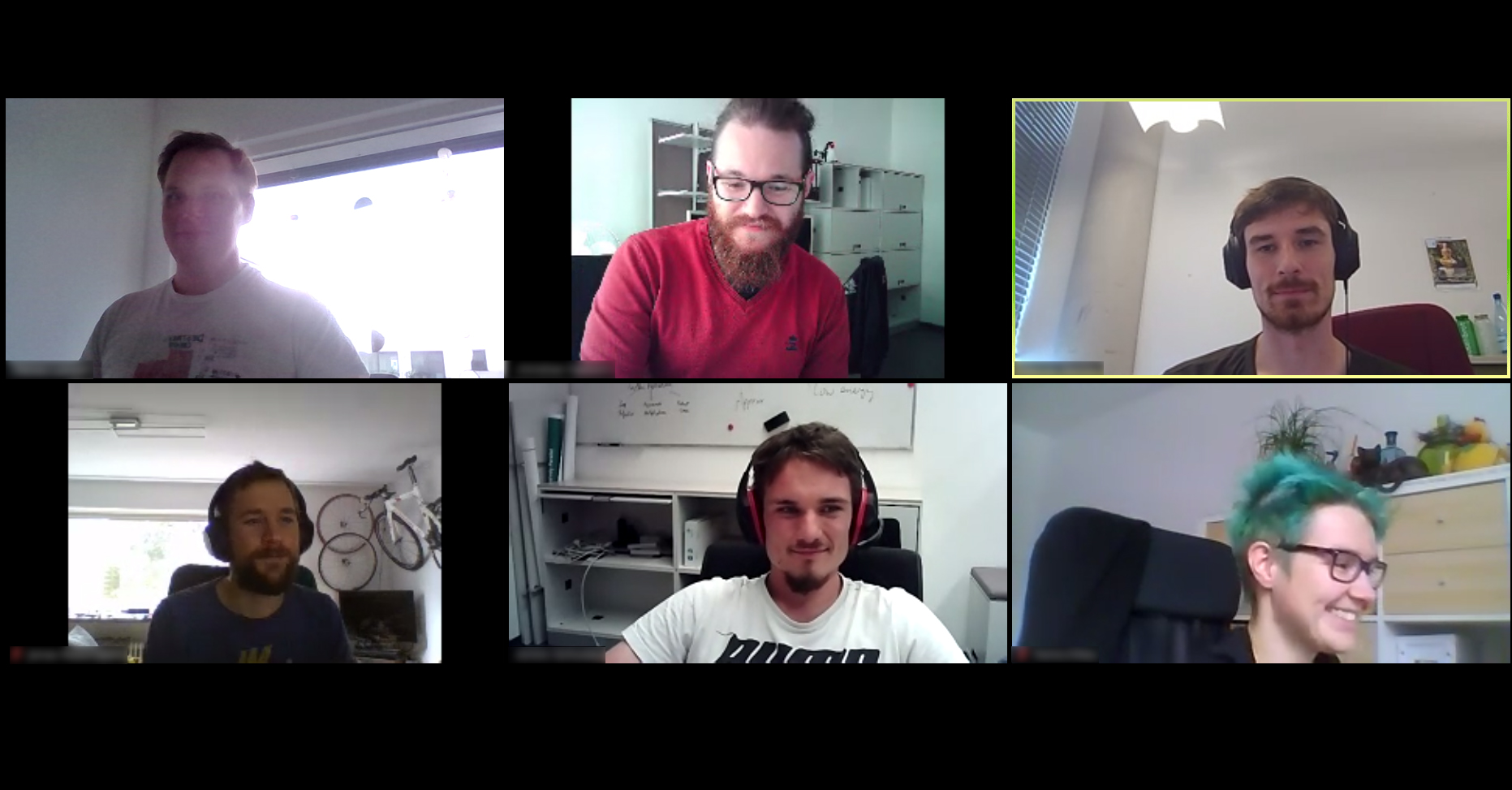
One of the small groups in which of doctoral researchers discussed details of their research work during DRR 2020-2.
Annual Meeting 2020, October 5-6, 2020, Web conference:
From 5 to 6 October, all researchers from the Transregional Collaborative Research Center Invasive Computing met online for the annual meeting. During the annual meeting projects and working groups presented their current status of work.
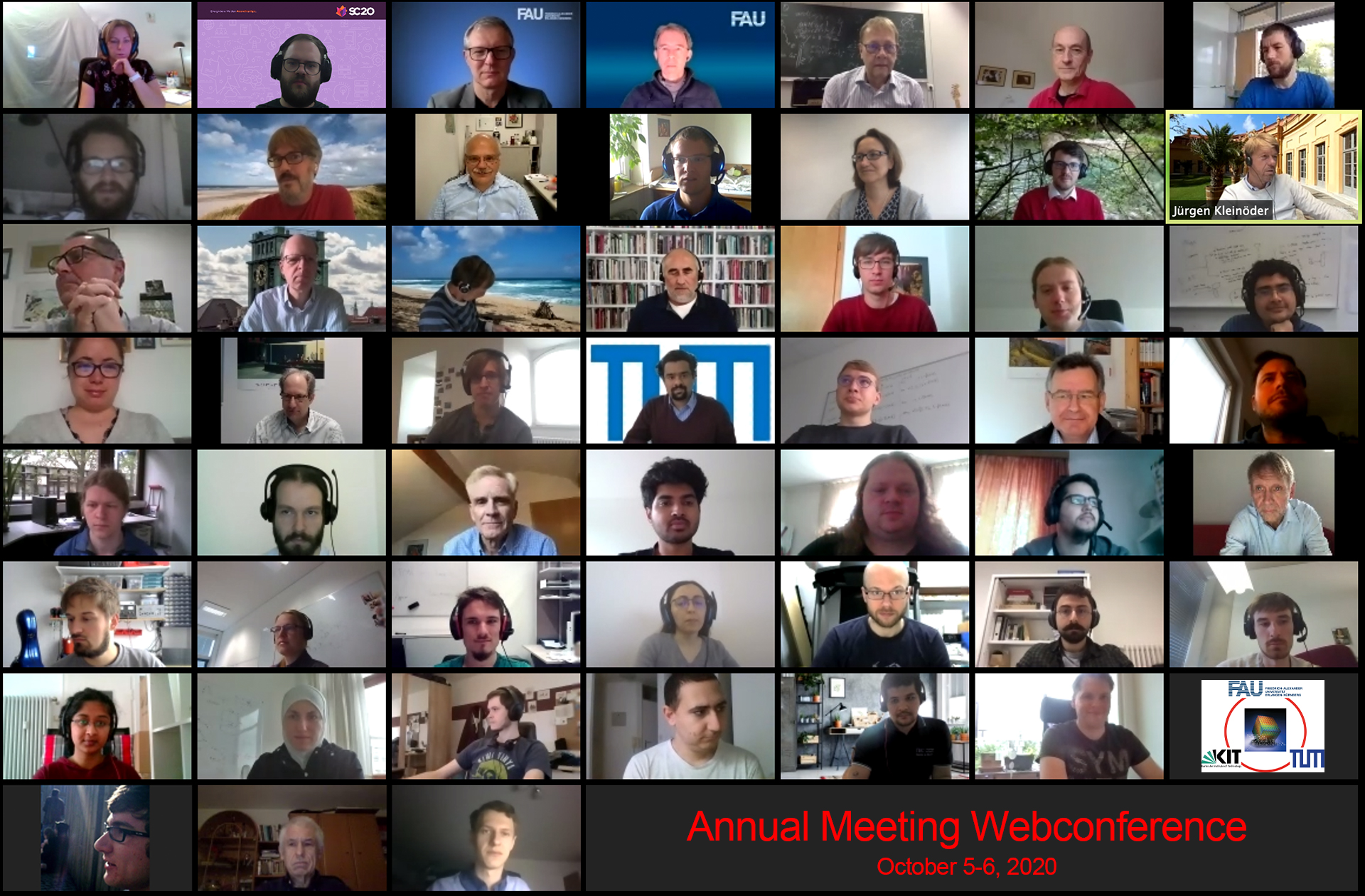
InvasIC members at the annual meeting web conference 2020.
Workshop on DVFS in Invasive Computing, August 6, 2020, Virtual Meeting:
The meeting of Working Group on Power and Thermal Aspects (WG4) and Z2 took place on Thursday, August 6, 2020 via Zoom. The agenda of the meeting was: 1. Presentation of project-specific works/requirements on DVFS 2. Z2: Presentation on which variants of DVFS support are possible on the FPGA system 3. Discussion on next steps, collaborations, demonstration, etc.
Working Group Meeting on Runtime Requirement Monitoring & Enforcement (WG1), July 24, 2020, Virtual Meeting:
Dirk Ziegenbein (Bosch Cooperate Research)
PD Dr.-Ing. habil. Daniel Müler-Gritschneder (TUM) organised the online workshop within the Working Group on Runtime Requirement Monitoring & Enforcement (WG1). WG1 met online on July 24, 2020 from 9 AM to 12 AM. Dirk Ziegenbein from Bosch Cooperate Research was invited to discuss runtime monitoring and enforcement for mixed-criticality, multi-core systems.
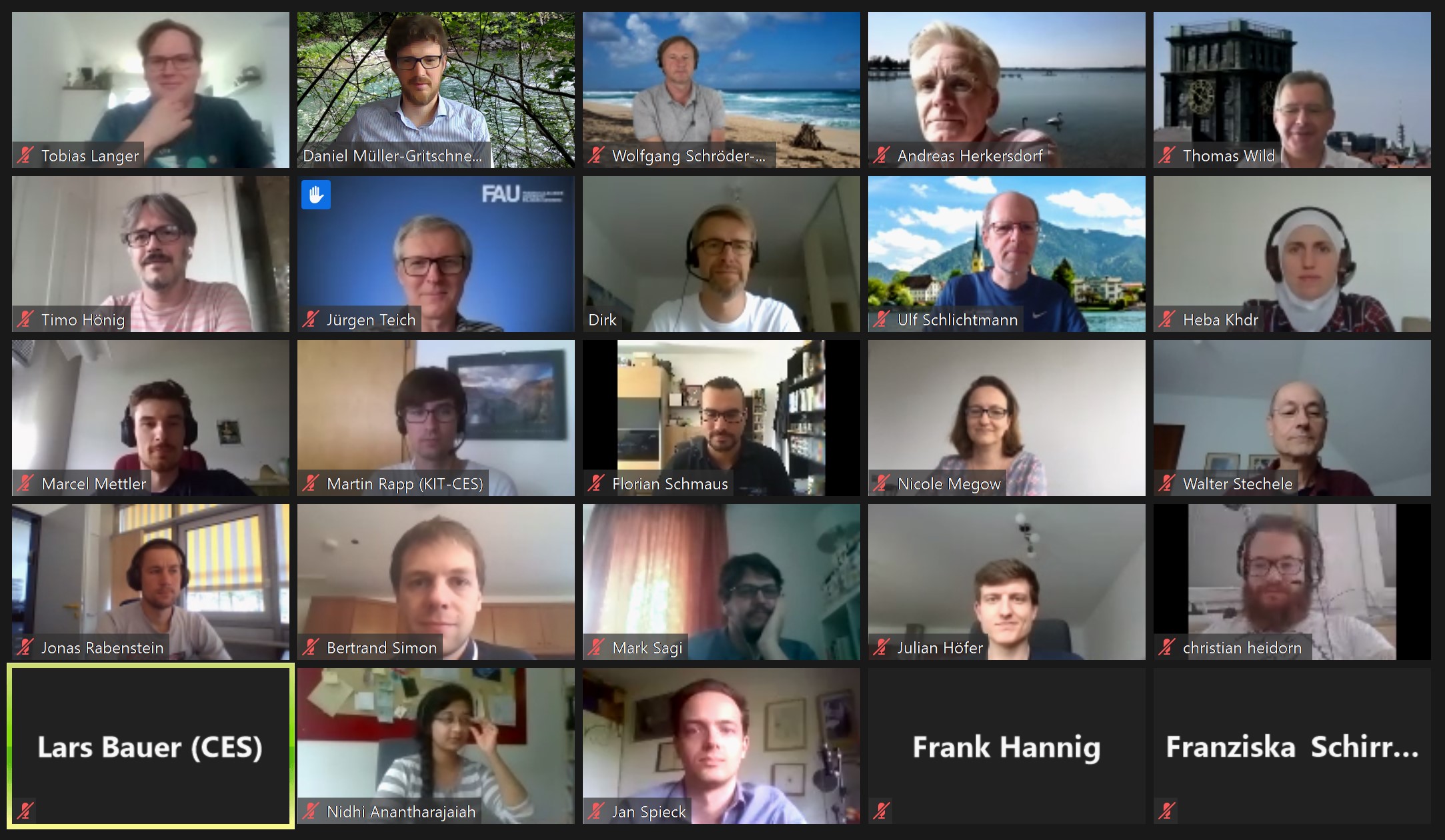
WG1 Virtual Meeting with Dirk Ziegenbein (Bosch Cooperate Research) on July 24, 2020.
Semi-Annual Meeting 2020, March 30-31, 2020, Web conference:
All researchers from the Transregional Collaborative Research Center Invasive Computing met in a big web conference for the semi-annual meeting because of the COVID-19 disease. From 30 to 31 March, researchers of all subprojects and working groups presented their progress in short talks.
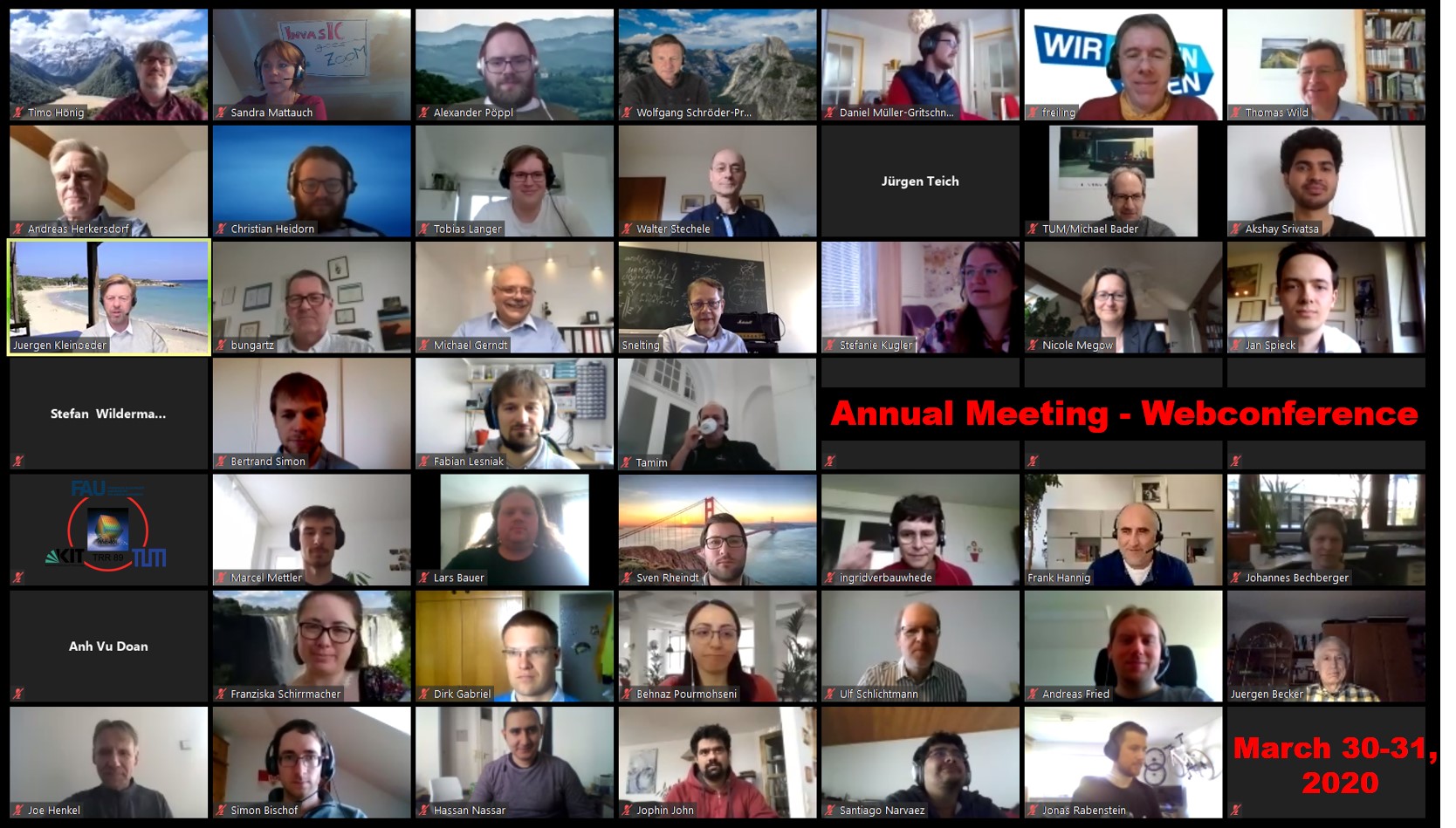
InvasIC members at the semi-annual meeting 2020.
Doctoral Researcher Retreat 2020, March 17-19, 2020, Web conference:
Due to the COVID-19 disease the Doctoral Researcher Retreat took place virtually. In order to protect our researchers on one side but to stay focused with our research work on the other side, the doctoral researchers met via web conference.
Working Group Meeting on Power and Thermal Aspects (WG4), March 3, 2020, TUM:
The meeting of Working Group on Power and Thermal Aspects took place on Monday, March 3, 2020.
Working Group Meeting on Evaluation and Benchmarking (WG3), March 2, 2020, LRZ/Munich:
The meeting of Working Group on Evaluation and Benchmarking took place on Monday, March 2, 2020. Researchers discussed among other aspects about using the OctoPOS x86 port on new machines provided in Erlangen and Munich for evaluation and demonstration. There was also a guided tour to the SuperMUC-NG and the visualization cave.
Events 2019
Working Group Meeting on Runtime Requirement Monitoring & Enforcement (WG1), November 15, 2019 at KIT:
The meeting of Working Group 1 took place on November 15, 2019 between 10:30 and 16:00. Researchers used the meeting to collaborate across projects.
Doctoral Researcher Retreat 2019, October 9-11, 2019:
From 9 to 11 October, our doctoral researchers met to discuss progress and further challenges of the third funding phase. This year's DRR took place at Meiser Design Hotel in Dinkelsbühl in conjuction with the annual meeting.
Annual Meeting 2019, October 7-8, 2019:
From 7 to 8 October, all researchers from the Transregional Collaborative Research Center Invasive Computing met for the annual meeting in 2019. This year's annual meeting took place at Meiser Design Hotel in Dinkelsbühl. During the annual meeting projects and working groups and their current status of work were presented.
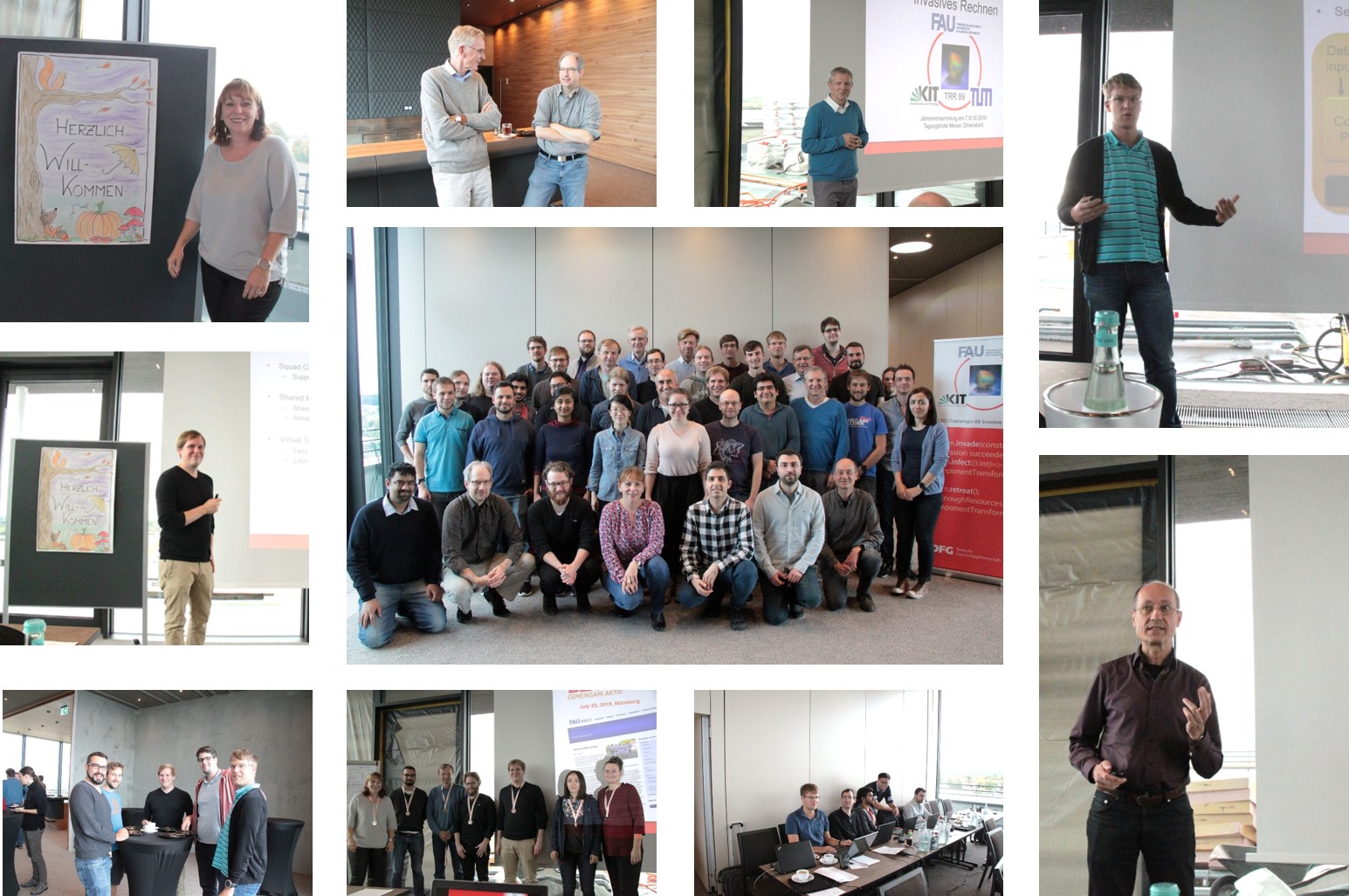
InvasIC members at the annual meeting 2019.
Working Group Meeting on Runtime Requirement Monitoring & Enforcement (WG1), July 26, 2019 at TUM:
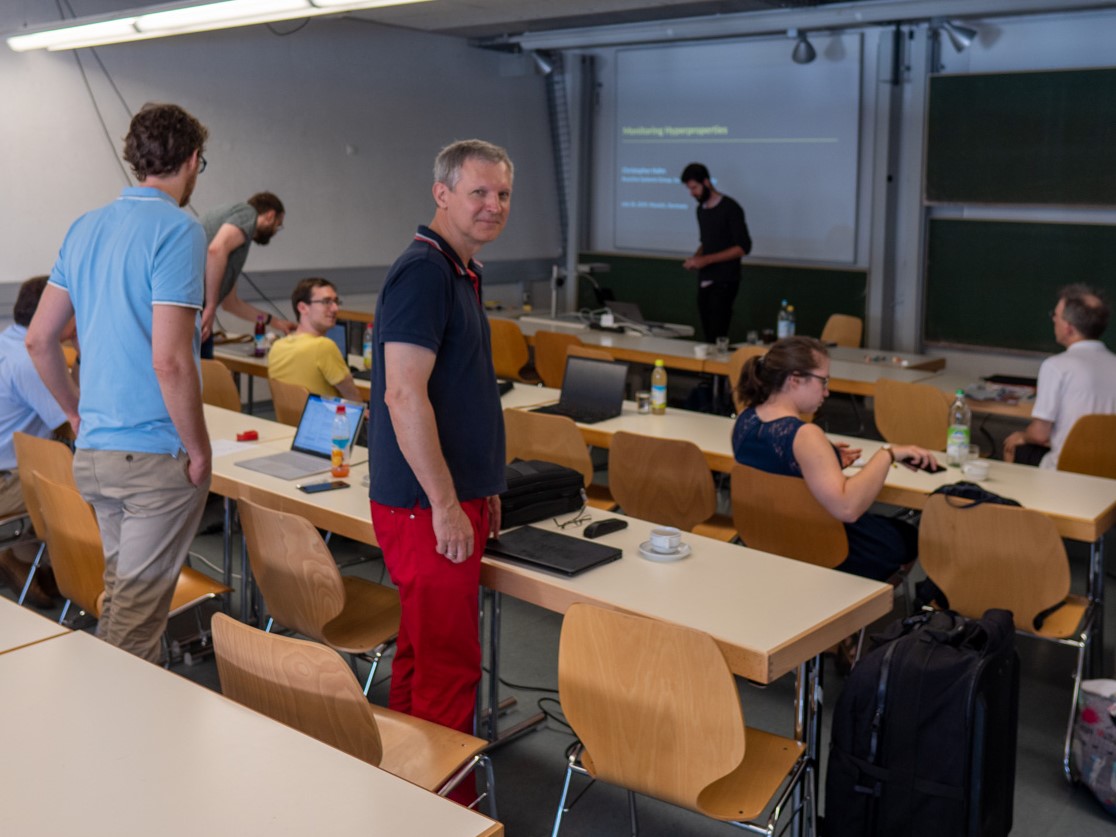
The second meeting of Working Group on Runtime Requirement Monitoring & Enforcement took place on Friday, July 26, 2019 between 9:00 and 14:00. We organized an informal preparation meeting the evening before. The main part of the meeting consisted of a tutorial on "hyperproperties" by Bernd Finkbeiner and Christopher Hahn from Saarland University. Hyperproperties are a way to express information flow properties in reactive systems. They extended the trace-based formalisms of temporal logics that we already got acquainted to in our first meeting (the tutorial Felix Klaedtke, Srdan Krstic and Dmitriy Traytel in Erlangen).
Working Group Meeting on Memory Models, Architecture and Management (WG2), July 1, 2019 at TUM:
The meeting of Working Group on Memory Models, Architecture and Management took place on Monday, July 1, 2019 between 10:45 till 16:00. The agenda of the meeting was: 1. Discussion of WG2 work items (especially those not started yet) 2. Presentation: Virtual Shared Memory - Current State & Future Steps 3. How to demonstrate merits of results 4. Spontaneous contributions of participants
Working Group Meeting on Evaluation and Benchmarking (WG3), June 14, 2019 at KIT:
The second meeting of Working Group on Evaluation and Benchmarking took place on Friday, June 14, 2019.
Doctoral Researcher Retreat 2019, February 26-28, 2019:
The first InvasIC DRR in 2019 took place in February 26-28, 2019. The doctoral researchers met at Ev. Akademie Bad Boll in Bad Boll.
Semi-Annual Meeting 2019, February 18-19, 2019:
From 18 to 19 February, all researchers from the Transregional Collaborative Research Center Invasive Computing met for the semi-annual meeting in 2019. This year's semi-annual meeting took place at Kloster Irsee.
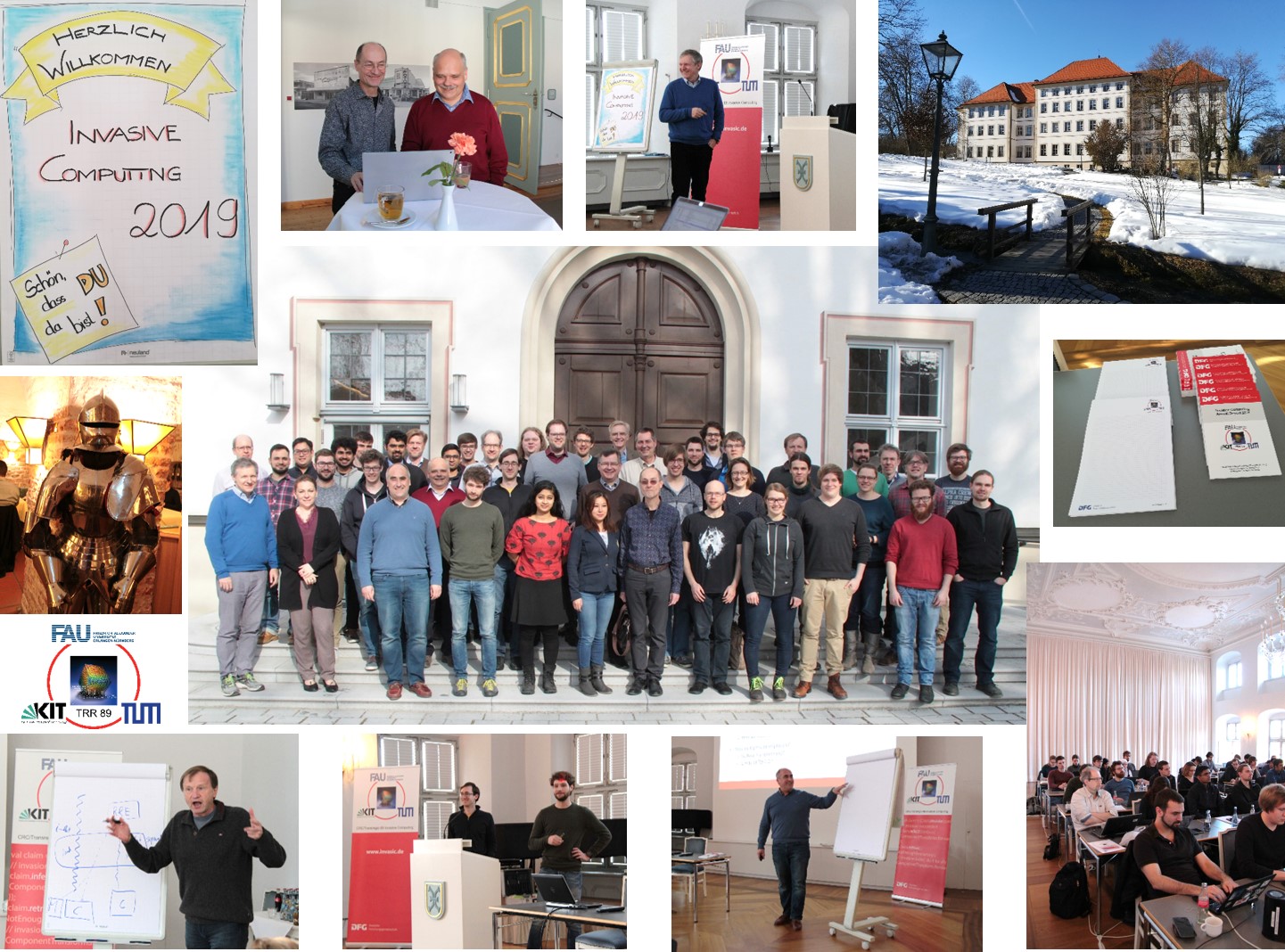
InvasIC members at the semi-annual meeting 2019.
Working Group Meeting on Evaluation and Benchmarking (WG3), January 28, 2019 at TUM:
The first meeting of Working Group on Evaluation and Benchmarking took place on Monday, January 28, 2019.
The goal of the Working Group Benchmarking and Evaluation was to identify potential demonstration scenarios for invasive computing, considering non-functional properties enforcement. A specific focus was on the exploitation of invasive computing methods after the end of the third funding phase. We planned to identify and collect success metrics for the exploitation of invasive methods in academia and industry, indicating the impact on the scientific community.
Events 2018
Working Group Meeting on Memory Models and Architectures (WG2), December 13, 2018 at TUM:
The first meeting of Working Group on Memory Models and Architectures took place on Thursday, December 13, 2018. Goal of the meeting was to have a personal exchange among memory related cooperations within our TRR. In our meeting, we took a "Top Down Approach", i.e. starting with the Application projects D1 and D3, in order to hear and understand their demands and wishes in terms of Invasive Computing memory services from OS, iRTSS and architecture. We then proceeded with short presentations from area C and B projects to obtain their status.
Working Group Meeting on Power and Thermal Aspects (WG4), December 6, 2018 at FAU:
The first meeting of Working Group on Power and Thermal Aspects took place on Thursday, December 6, 2018. The goal of our WG4 was to establish a common tool set to model, simulate, and measure power, temperature and energy in the SFB's projects. In our first meeting, we identified:
- Which tools (power, energy, temperature) are currently developed in InvasIC?
- Which tools (power, energy, temperature) are required?
- What would be a platform which allows us to share these tools within the SFB?
Doctoral Researcher Retreat 2018, October 24-26, 2018:
From 24th to 26th October, the doctoral researchers met for 2018's DRR at the Löwenstein Conference Centre. The main point of discussion was the reorganisation of the InvasIC hardware prototype with a view to upcoming upgrades. Additionally, several research projects for the third funding phase were kick-started. As a way of welcoming new doctoral researchers, a team building event was also held during the DRR.
Annual Meeting 2018, October 11-12, 2018:
This year's annual meeting took place at Parkhotel Schmid in Adelsried.
Movie: Annual Meeting 2018
Working Group Meeting on Runtime Requirement Monitoring & Enforcement, September 25-26, 2018 at FAU:
The first meeting of WG1 on Runtime Requirement Monitoring and Enforcement took place on Wednesday, September 26, 2018, 9:00 AM to 1 PM Seminar room 12.150 Martensstr. 3 91058 Erlangen. There was a preparation meeting on Tuesday evening (September 25, 2018) in Erlangen. The main part of the meeting was a tutorial by Felix Klaedtke (NEC), Srdan Krstic (ETHZ) and Dmitriy Traytel (ETHZ) on runtime enforcement covering the following aspects:
- runtime enforcement definition
- formalizing properties: safety, liveness
- higher order (non-functional) properties
- enforcement automata
- languages to express enforcement properties
- practical systems for runtime enforcement
The end of the meeting consisted of planning the next activities of WG1.
DFG Review Meeting, January 24-25, 2018:
In january the DFG Head Office, the review panel and researchers from all projects of InvasIC met for the DFG review meeting in Karlsruhe.
Rehearsal II, January 12, 2018:
In Karlsruhe, researchers from all projects met again to prepare the DFG review meeting in January.
Events 2017
Rehearsal I, December 14, 2017:
In Karlsruhe, researchers from all projects met to prepare the DFG review meeting in January.
Annual Meeting 2017, September 20-21, 2017
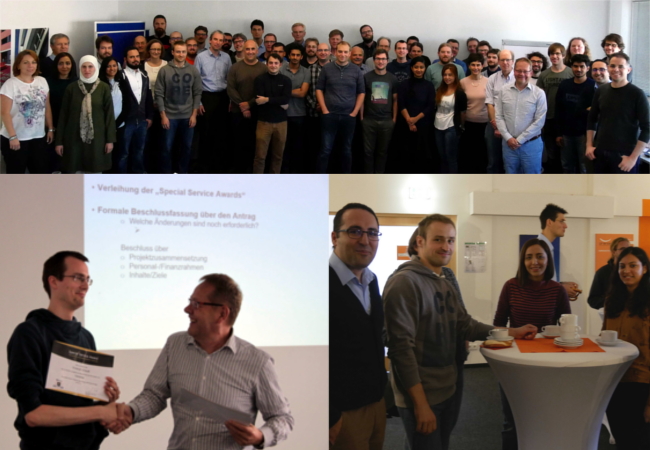
This year's annual meeting took place in the Orange Hotel und Apartments. During the annual meeting projects and working groups and their current status of work were presented. Furthermore, details of the proposal and review for the third funding phase were discussed. In addition, some doctoral researchers were honoured for their dedicated commitment.
Doctoral Researcher Retreat 2017, September 13-15, 2017
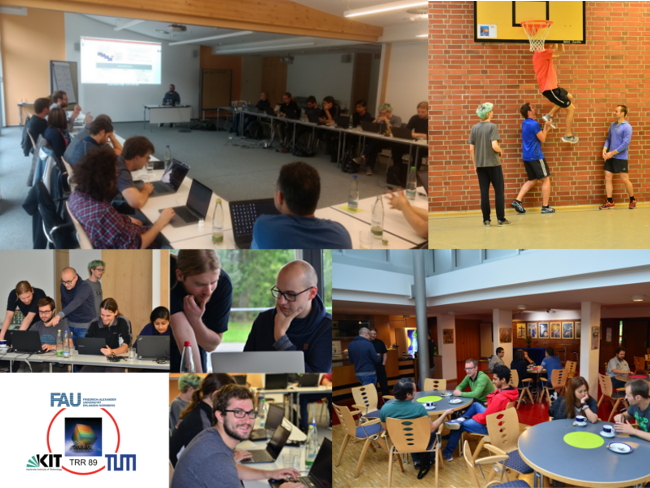
The 11th InvasIC DRR took place in September. The doctoral researchers met at Bernhäuser Forst in Filderstadt
Sommer of Code, August 7/8, 2017:
Researchers from different projects met in Munich at this year's “Sommer of Code” to advance the integration and stability of the invasive technology stack.
PI-Meeting 2017, June 9, 2017 at TUM:
PIs met to focus on the third funding phase.
Spring of Code, April 12/13, 2017:
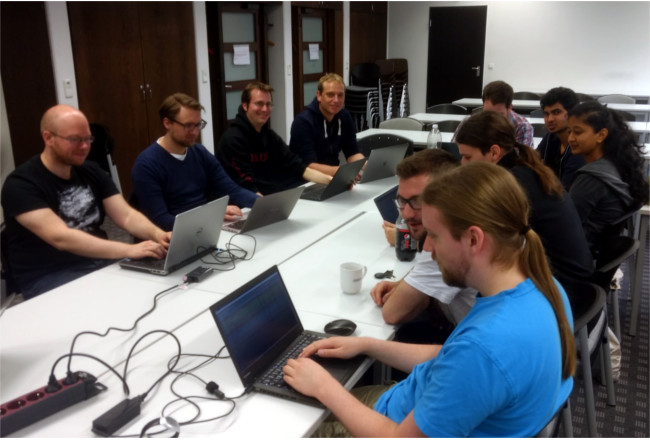 Researchers from different projects met at this year's “Spring of Code” to advance the
integration and stability of the invasive technology stack. To be able to showcase the unique
technologies of our invasive platform, all of its many different components must fit together
seamlessly: from hardware units (i-Core, NoC, TCPA) via the OS, agent system and X10 runtime system up to the actual
invasive applications.
Participants were given the unique opportunity to sit together in one spot for two days and do hands-on
work on a number of concrete cross-layer topics.
Researchers from different projects met at this year's “Spring of Code” to advance the
integration and stability of the invasive technology stack. To be able to showcase the unique
technologies of our invasive platform, all of its many different components must fit together
seamlessly: from hardware units (i-Core, NoC, TCPA) via the OS, agent system and X10 runtime system up to the actual
invasive applications.
Participants were given the unique opportunity to sit together in one spot for two days and do hands-on
work on a number of concrete cross-layer topics.
Semi Annual Meeting 2017, February 20/21, 2017:
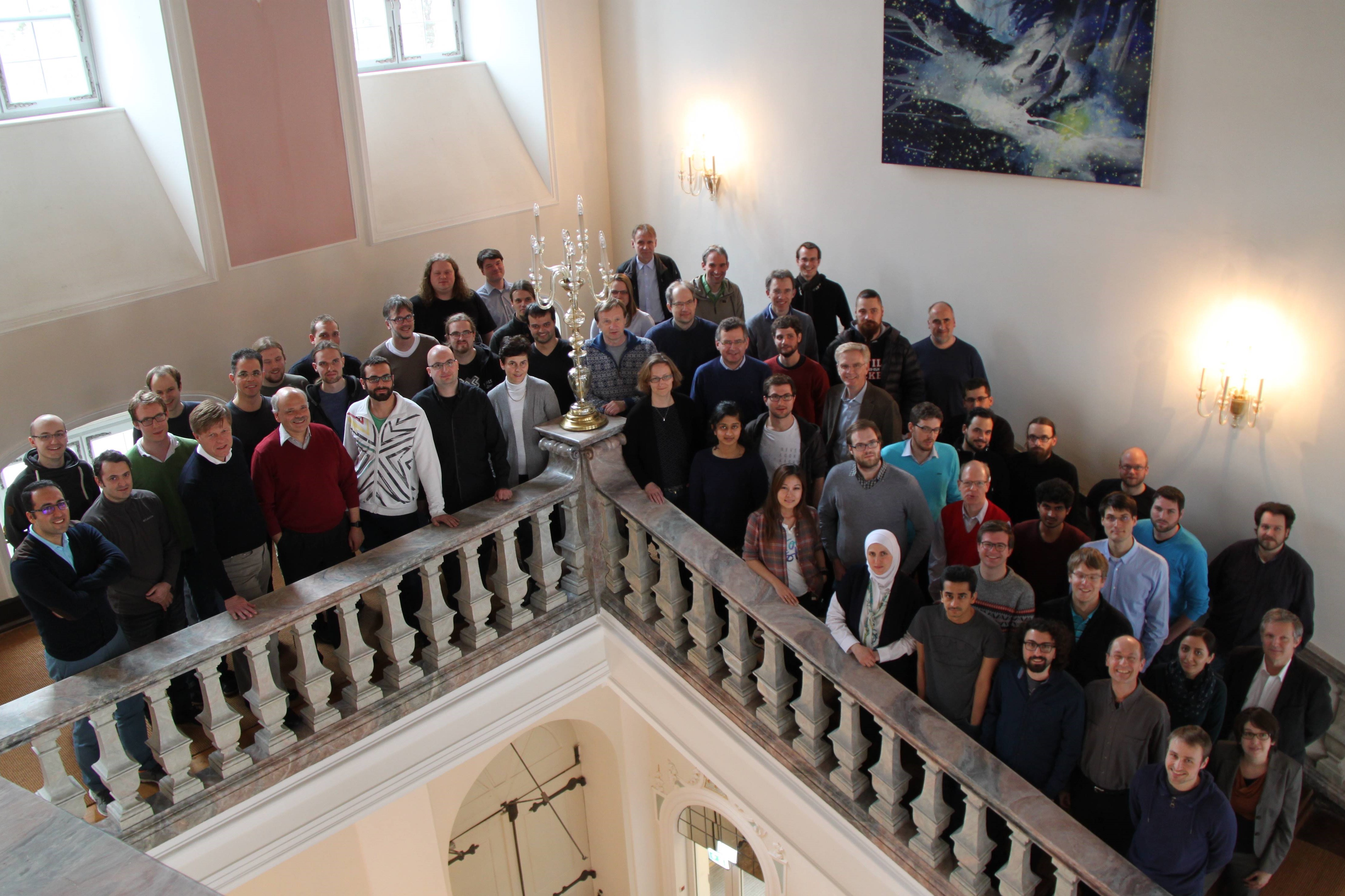 From February 20th till 21st all researchers from the Transregional Collaborative Research Center Invasive Computing met for the first annual meeting in 2017 at
Kloster Irsee.
This session was very important to set the tone for phase three of the research project and to decide which research topics should be followed on in the future.
The meeting was characterised by presentations of the different subprojects that showed what they had accomplished so far in their research. At the second day,
the management board meeting and meeting of the members took place. In the end, a roadmap for phase three of the research project could be set up.
From February 20th till 21st all researchers from the Transregional Collaborative Research Center Invasive Computing met for the first annual meeting in 2017 at
Kloster Irsee.
This session was very important to set the tone for phase three of the research project and to decide which research topics should be followed on in the future.
The meeting was characterised by presentations of the different subprojects that showed what they had accomplished so far in their research. At the second day,
the management board meeting and meeting of the members took place. In the end, a roadmap for phase three of the research project could be set up.
Doctoral Researcher Retreat 2017, February 08-10, 2017
The 10th InvasIC DRR took place in February at Parkhotel Schmid in Adelsried.
PI Meeting 2017, February 3, 2017
The Principal Investigators of InvasIC met in Munich to discuss ideas for the third funding phase.
Events 2016
Annual Meeting 2016, September 15-16, 2016
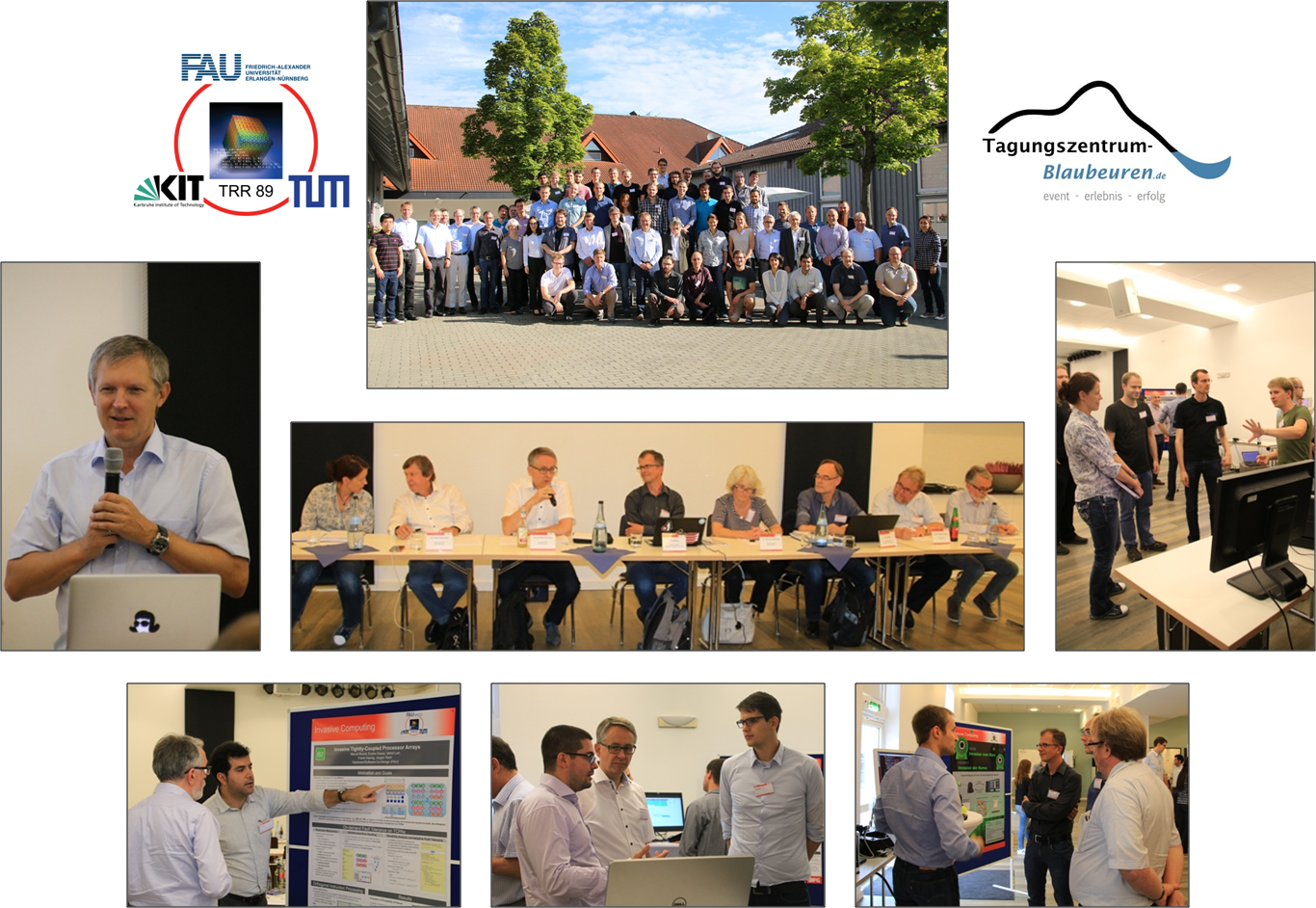
This year's annual meeting took place in the Tagungszentrum Blaubeuren in conjunction with the third meeting of the InvasIC Industrial and Scientific Board.
The main focus of the internal meeting on the first day was on reviewing and discussing the progress achieved on two of the main topics of the Transregios second funding phase, Predictability and Demonstrations. Additionally, three young scientists, Hananeh Aliee (FAU), Timo Hönig (FAU) and Santiago Pagani (KIT), gave a talk on their current work and its correlation to the topics of Invasive Computing.
On the second day of the Annual Meeting Michaela Blott (Xilinx, Dublin), Dr. Peter Hans Roth (IBM B&oum;blingen), Klaus-Dieter Schubert (IBM Böblingen), Urs Gleim (Siemens Corporate Technology), Dr. Patricia Sagmeister (IBM Rüschlikon), Elmar Maas (IAV, Gifhorn) and Hans-Christian Hoppe (Intel ExaCluster Lab Jülich) from the InvasIC Industrial and Scientific Board attended the meeting to evaluate the ideas and progress of the presented projects and demonstrations. As an introduction, Prof. Jürgen Teich (Coordinator) gave an overview about all projects involved into the CRC/Transregio. The following poster and demonstration session brought a good opportunity for the Board’s members to get an idea about the current state of research in InvasIC. In the concluding plenary session, the opinions and suggestions of the Board’s members were collected and discussed.
Doctoral Researcher Retreat 2016, September 12-14, 2016
The 9th InvasIC DRR took place in September in connection with the Annual Meeting 2016 in Blaubeuren.
Demonstrator Meeting, June 1, 2016 at TUM
Members of WG3 met in Munich to continue discussions on the Demonstrator.
Working Group Meeting on Memory Hierarchy, May 3, 2016 at TUM
Members of WG2 met in Munich to (i) continue discussion on Inter-Tile Cache Coherency and (ii) start discussion on MMU for the InvasIC Architecture.
Doctoral Researcher Retreat, March 7-9, 2016
At the DRR our Ph.D. students discussed the challenges of the second funding phase. The DRR took place at Roemerhotel in Aalen. meeting place
Annual Meeting 2016, February 15-16, 2016
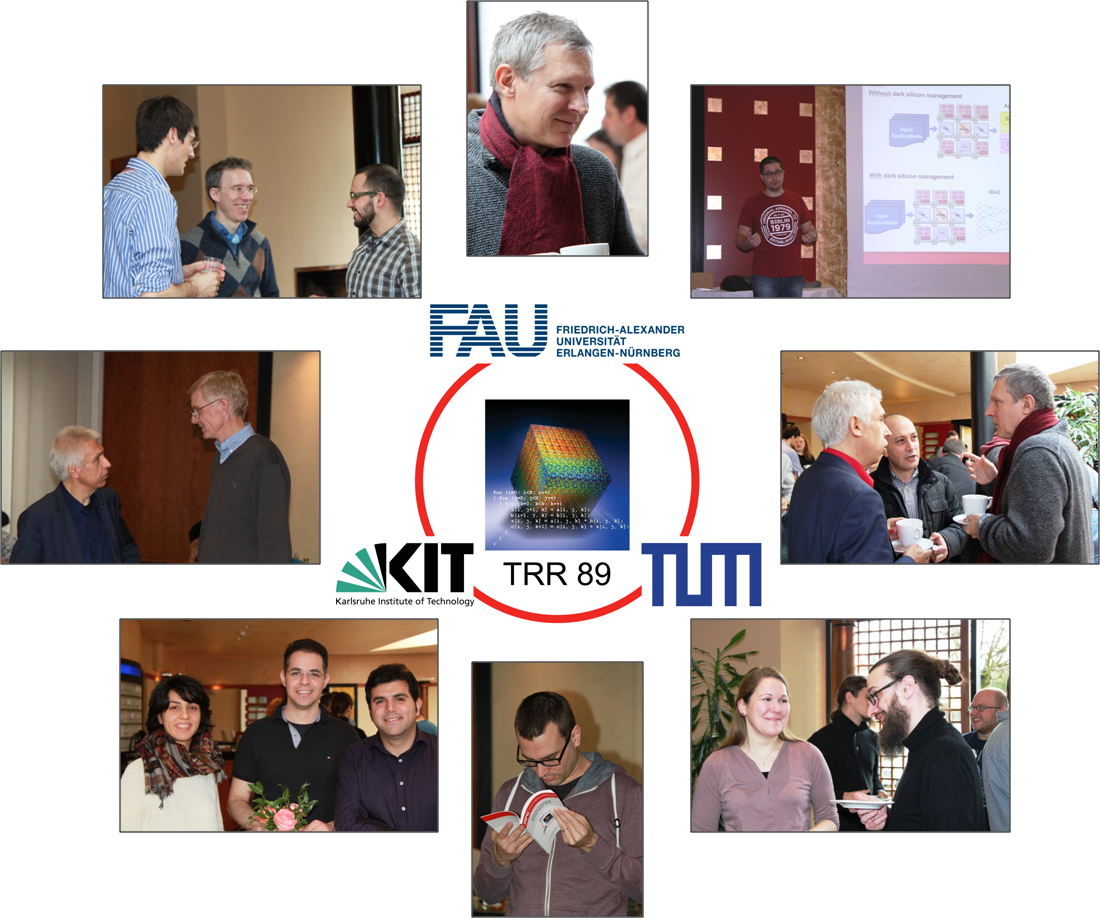 The semi-annual meeting 2016 took place at Parkhotel Schmid in Adelsried where all researchers met. In short talks all subprojects and working groups presented their progress. Additionally, each project introduced the
ideas for the demonstration platform on a plenary session.
The semi-annual meeting 2016 took place at Parkhotel Schmid in Adelsried where all researchers met. In short talks all subprojects and working groups presented their progress. Additionally, each project introduced the
ideas for the demonstration platform on a plenary session.
Events 2015
Annual Meeting 2015, October 15-16, 2015
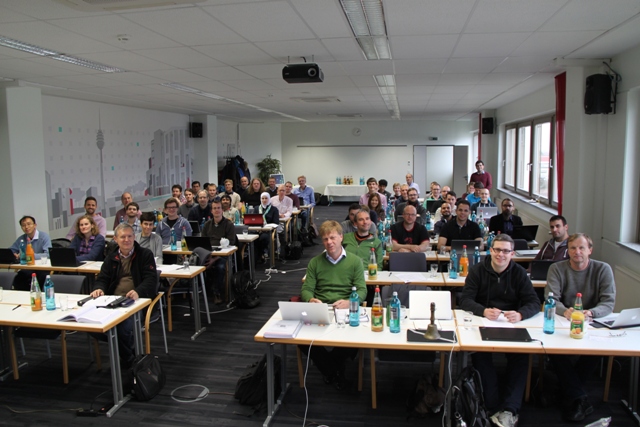
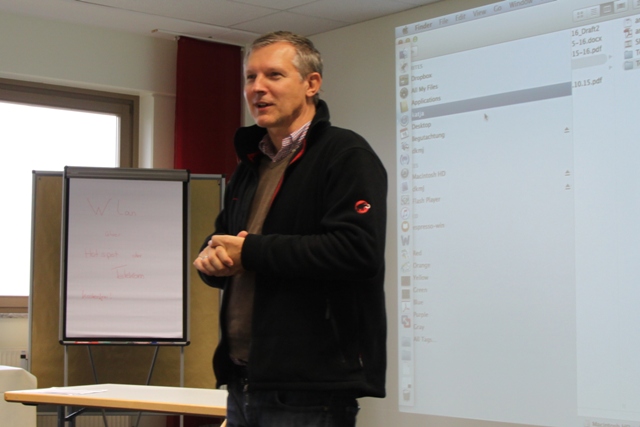 This year's Annual Meeting took place at NOVINA Hotel Südwestpark in Nuremberg. In short talks subprojects and working groups presented their progress.
meeting place
This year's Annual Meeting took place at NOVINA Hotel Südwestpark in Nuremberg. In short talks subprojects and working groups presented their progress.
meeting place
Doctoral Seminar on Predictability at Sarntal Academy 2015
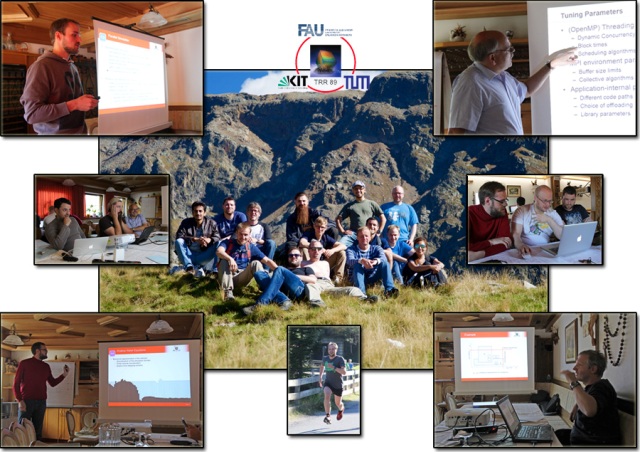 September 20-October 02, 2015, Sarntal: Prof. Michael Gerndt and Prof. Michael Glaß organized a doctoral seminar for the working group on predictability of the CRC/Transregio 89 titled "Benchmarking for Multi-Criteria-Predictable
Multi-Core Computing" at the Sarntal Academy in South Tyrol, Italy. The organizers, doctoral researchers, as well as the guest lecturers Prof. Jürgen Teich, Prof. Wolfgang Schröder-Preikschat, Prof. Michael Bader, PD Dr. Daniel Lohmann,
and Dr. Stefan Wildermann presented state-of-the-art and ongoing research to enhance and deepen the predictability-awareness across all projects. Topics such as (i) the modeling of requirements and assumptions wrt. quality numbers such
as timing, reliability, security, or power, (ii) a formal underpinning for the general design flow, (iii) challenges for predictability in the context of invasive applications, system software, and architectures, as well as (iv) concepts
for benchmarks and demonstrators have been discussed and results been documented in concrete code examples and white papers. Following the tradition of the Sarntal Academy, hiking as well as other group activities enabled to compensate
for the hard but successful work.
September 20-October 02, 2015, Sarntal: Prof. Michael Gerndt and Prof. Michael Glaß organized a doctoral seminar for the working group on predictability of the CRC/Transregio 89 titled "Benchmarking for Multi-Criteria-Predictable
Multi-Core Computing" at the Sarntal Academy in South Tyrol, Italy. The organizers, doctoral researchers, as well as the guest lecturers Prof. Jürgen Teich, Prof. Wolfgang Schröder-Preikschat, Prof. Michael Bader, PD Dr. Daniel Lohmann,
and Dr. Stefan Wildermann presented state-of-the-art and ongoing research to enhance and deepen the predictability-awareness across all projects. Topics such as (i) the modeling of requirements and assumptions wrt. quality numbers such
as timing, reliability, security, or power, (ii) a formal underpinning for the general design flow, (iii) challenges for predictability in the context of invasive applications, system software, and architectures, as well as (iv) concepts
for benchmarks and demonstrators have been discussed and results been documented in concrete code examples and white papers. Following the tradition of the Sarntal Academy, hiking as well as other group activities enabled to compensate
for the hard but successful work.
WG3 demonstrator workshop, July 16, 2015 at TUM:
Members of WG3 met in Munich to discuss the demonstrator. They started with the application projects, continued with OctoPOS, agents, compiler, then with hardware projects, TCPA, i-core, i-NoC, and finally the Z2 demonstrator platform.
Working Group Meeting on Predictability, May 22, 2015
Members of WG1 met in Munich.
more information
Doctoral Researcher Retreat, March 23-25, 2015
The 7th InvasIC DRR took place at Roemerhotel in Aalen.
Working Group Meeting on Memory Hierarchy, March 16, 2015
Members of WG2 met in Munich to discuss the technical details and their implications on memory hierarchy, memory model, OS and applications.
Annual Meeting, February 12-13, 2015
This year's Annual Meeting took place at Parkhotel Schmid in Adelsried. meeting place
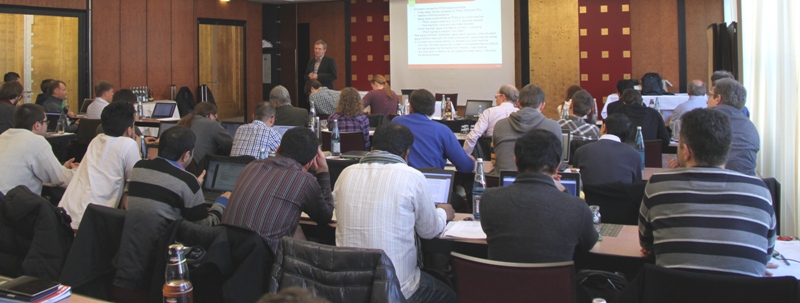
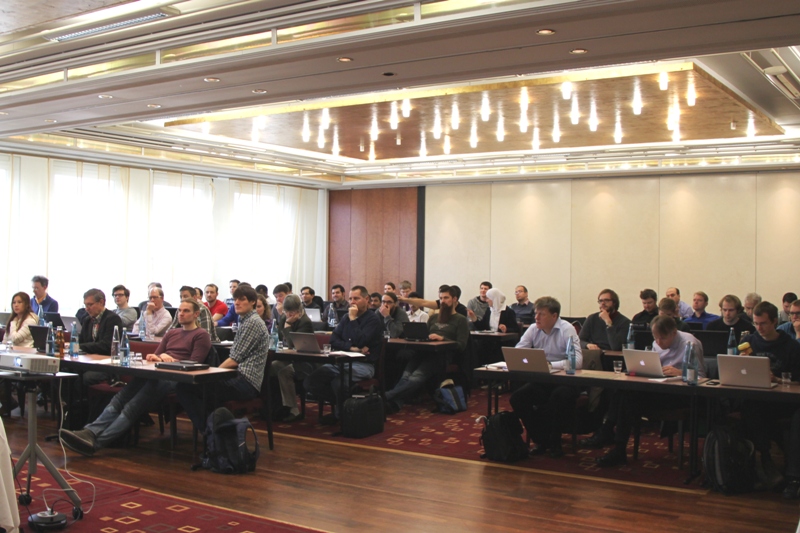
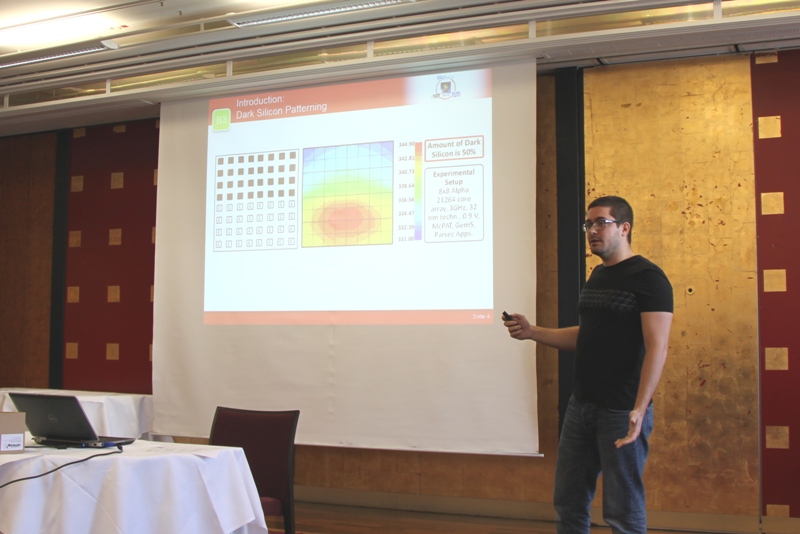
Working Group Meeting on Predictability, January 21, 2015
Subjects of debate of the second working group meeting were security requirements.
Events 2014
Working Group Meeting on Predictability, December 8, 2014
At the first meeting of the Working Group on Predictability, 21 participants discussed the cross-cutting aspect of predictability within the CRC/Transregio 89. Particular focus was put on discussing and fixing major working topics and the respective involvement of each project, assigning topic chairs, establishing a common information management system, and creating a predictability glossary.
Annual Meeting, October 23-24, 2014
This year's Annual Meeting took place at Römerhotel in Aalen.
meeting place
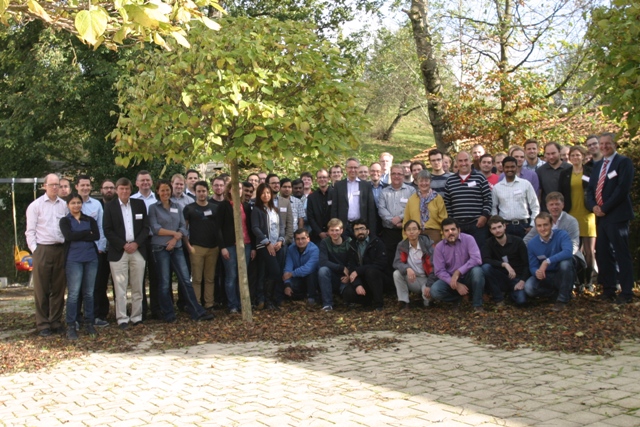
Doctoral Researcher Retreat, September 15-17, 2014
The 6th InvasIC DRR took place at Tagungshotel Schönenberg in Ellwangen. meeting place
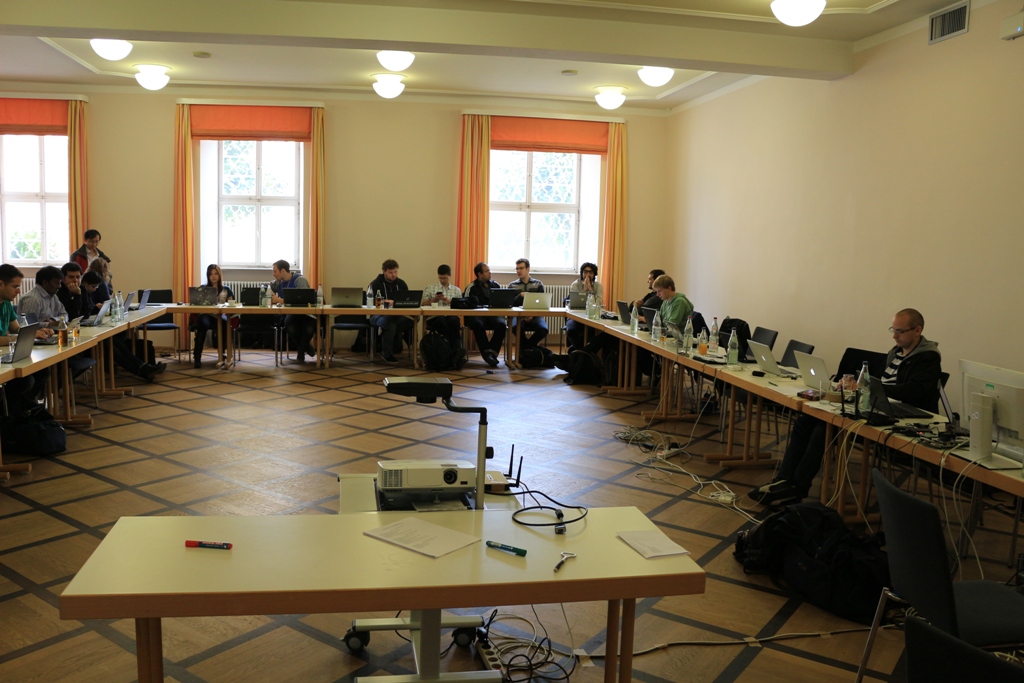
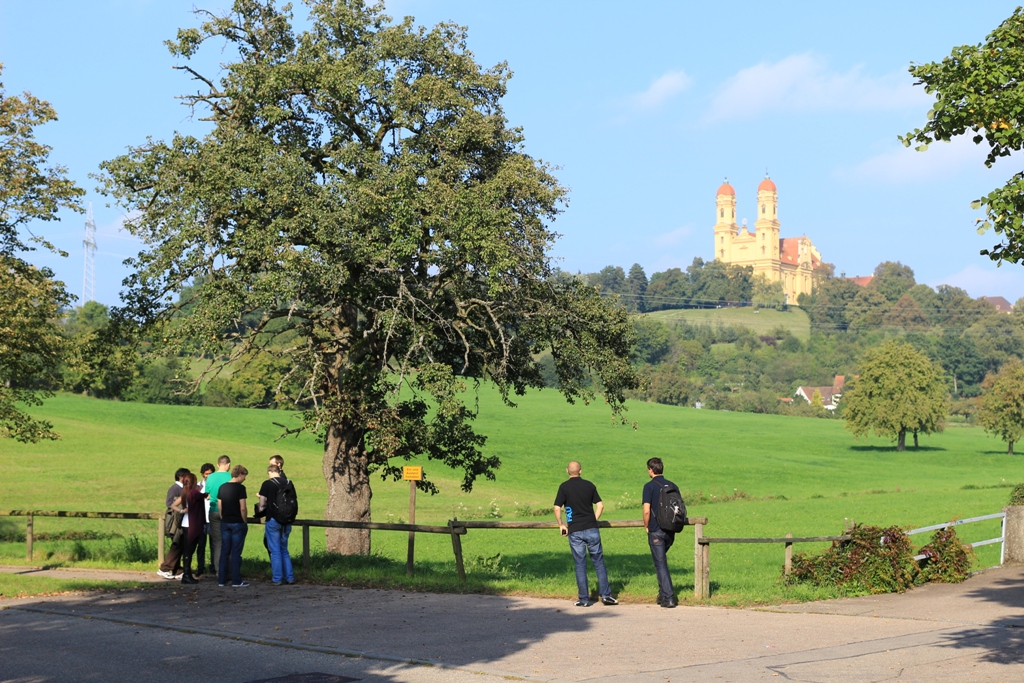
Begutachtung: February 11-12 2014, IAS, Garching
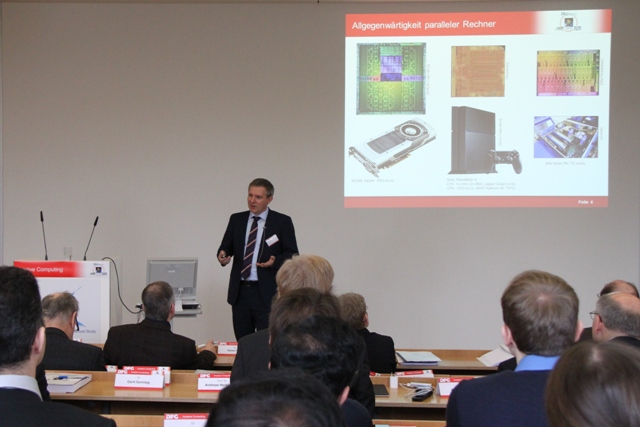
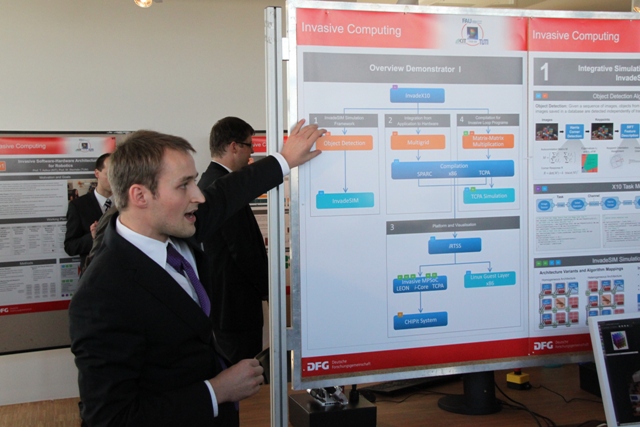
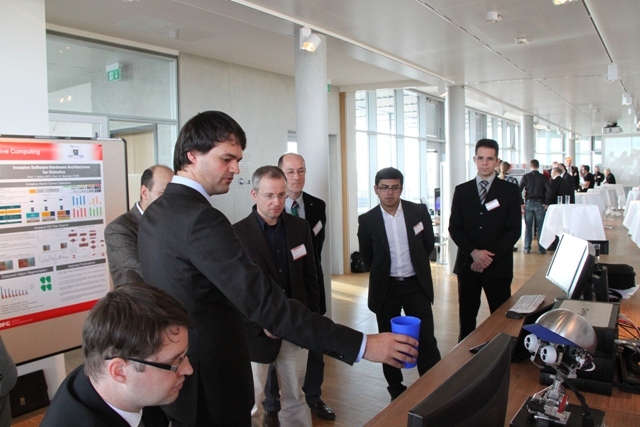
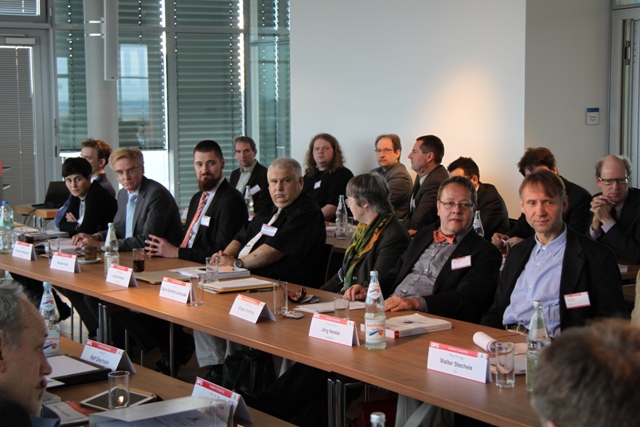
Probebegehung II: January 28, 2014, LRZ, Garching
Probebegehung I: January 10, 2014, IAS, Garching
Events 2013
Annual Meeting 2013, October 9-10, 2013
This year's Annual Meeting took place at Schlosshotel Pommersfelden, Germany.
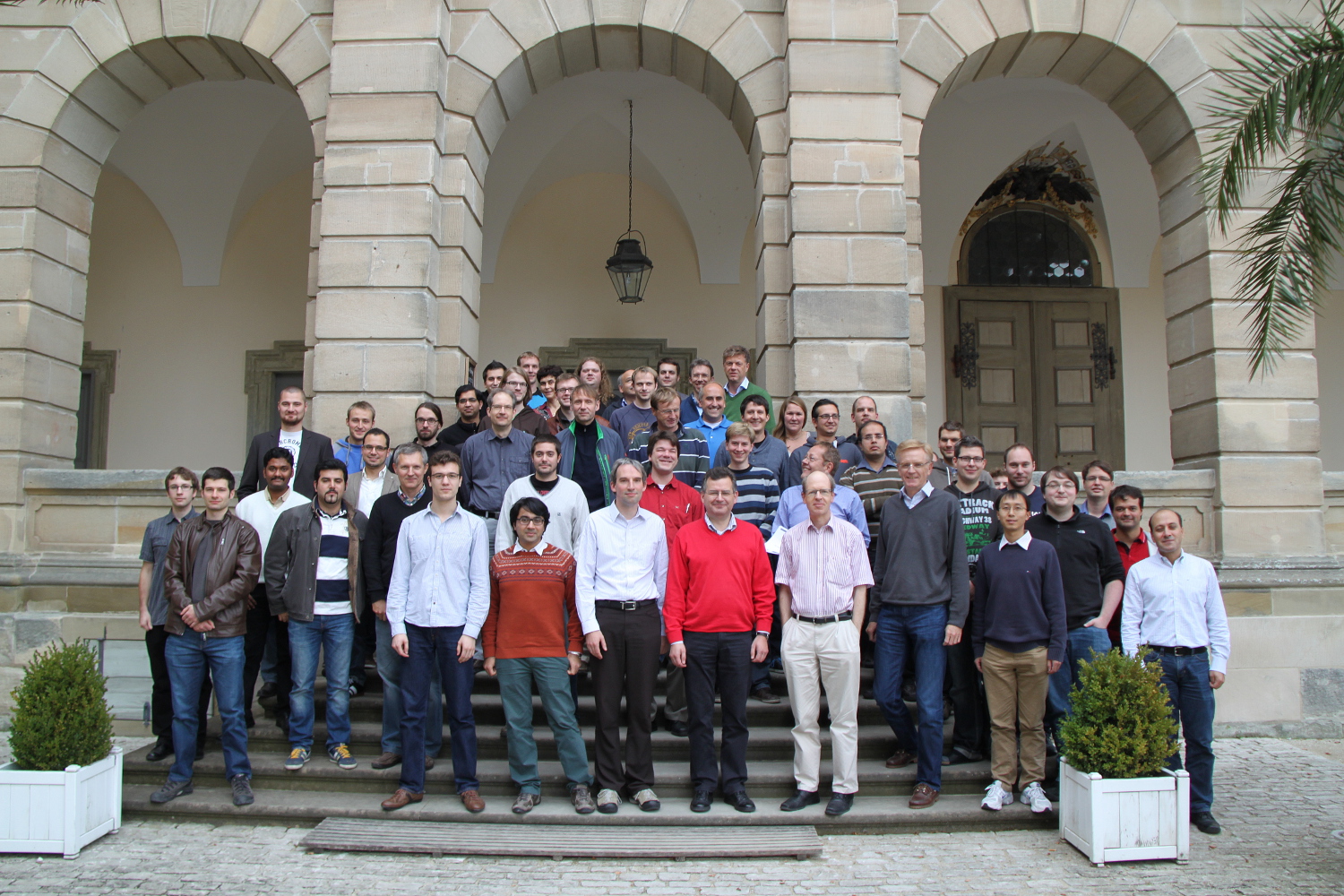
Doctoral Researcher Retreat, October 7-11, 2013
The 4th InvasIC DRR took place in connection with the Annual Meeting 2012 at Schlosshotel Pommersfelden, Germany
PI-Meeting: October 11 2013, Pommersfelden
Summer of Code: July 25-26, 2013, TUM
The focus of this year's Summer of Code meeting was on bringing the ChipIT based demonstrator up and running at the project review in February 2014. Based on the invasive computing scenarios to be shown by the application projects D1 and D3 the status of the demonstrator integration was reviewed. Open technical issues were identified and addressed in small group discussions among the involved sub-projects. Special focus was on the integration process of sub-project contributions on the ChipIT platform and further testing of each component. For better planning of the last phase of the demonstrator integration the milestone plan was revised and a tracking system of work in progress was introduced.
PI-Meeting: July 19, 2013, FAU
Demonstrator Meeting, Friday, April 12, 2013 (IFA, KIT):
Goal of the meeting will be to discuss the progress towards the milestones of the minimal demo setup.
Semi-annual meeting 2013, February 21-22, 2013, Hotel Höhenblick, Mühlhausen im Täle
56 scientists met at the semi-annual meeting of the TCRC 89 "Invasive Computing" 2013 in Mühlhausen im Täle.
In short talks the status quo of subprojects was summarised. Additionally, each project introduced the ideas for the follow-up proposal.
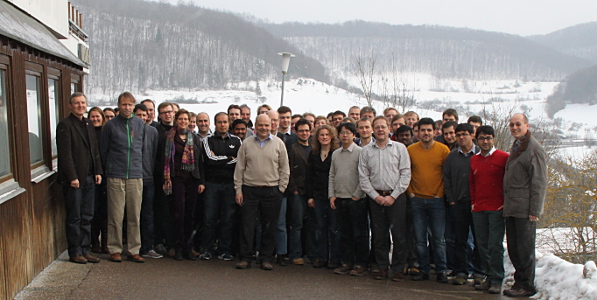
DRR 2013 I, February 18-20, 2013, Hotel Höhenblick, Mühlhausen im Täle
The first InvasIC DRR in 2013 took place in connection with the semi-annual meeting in Mühlhausen im Täle.
Language Working Group Workshop, January 14, 2013, KIT
The main topics of the general Language Workshop with 18 participants were granularity, approval of LPCs (Language Change Proposals) and possible implementations.
Events 2012
Architecture Working Group Workshop, December 17, 2012, TUM
The AK Architecture meeting was attended by 19 Invasive Computing partners from all three sites. The main topic of the meeting was a continuation of the discussion on the granularity of invade / infect operations with the emphasis on aspects affecting the invasive-specific hardware architecture. The meeting was kicked-off by a summary of Wolfgang Schröder-Preikschat on the decisions made during the AK Sprache Workshop on December 7. Default granularity of invade and infect is entire tiles, with the option to support finer granularity (individual cores) through constraints. We then discussed how such constraints are signaled to the CIC in form of Claim- and Application-Class-IDs within i-lets. The CIC will process these IDs and perform a two staged mapping (rule-based evaluation of Claim-ID to determine the eligible core subset within the tile, followed by a linear optimization to map i-lets to cores according to application classes (preferred maximum available processing resources, “coolest” core, least power consumption, etc.). Claim- and Application-Class-ID can be covered with 8 bits in an i-let, assuming tiles with 4 cores and not more than 8 application classes. We also discussed a meaningful concatenation of multiple i-lets to be sent within one iNoC packet to ensure synchronous scheduling and execution within the tile. Further topics were updates on the TCPA connectivity into the tiled invasive architecture and the CHIPit demonstrator.
Workshop "Nicht nur für Simulanten", December 5, 2012, FAU
Project C2 organised an one-day workshop on the usage and the application areas of the functional simulator on December 5, 2012. There, the functionality and the potential of the simulator was presented and the participants acquired the necessary knowledge to simulate and evaluate X10-based programs in practical exercises. Furthermore, they were given an insight into the internal structure of the simulator in order to introduce own extensions. Finally, the 16 participants discussed the following topics: Modelling of heterogeneous tiled architectures, integration of invasion and load balancing strategies, integration of monitors, and actor-based application modelling.
Expertentreffen "Granularität der Invasion", December 7, 2012, KIT
Beim Treffen am 7.12. wurden Details der Invasion sowie das Zusammenspiel mit dem CiC erörtert. Es wurde festgestellt, dass Invasion aus Anwendersicht kernweise erfolgen kann und manchmal sogar muss, wogegen das Betriebssystem evtl. intern eine kachelweise Zuteilung vornimmt. Zur effizienten Unterstützung muss der CiC zu einem "Tagged CIC" erweitert werden.
Annual Meeting 2012, October 11-12, 2012
This year's Annual Meeting took place in Kloster Irsee, Germany. 55 scientists met to review and discuss the progress made in the last year. In short talks subprojects and the three working groups (language and applications, system software and architectures) presented their progress with focus on the next working packages and project ideas for the second funding phase of the SFB/TRR 89. The meeting program also comprised a poster session and first demonstrations. On the second day of the Annual Meeting 6 members of the "InvasIC Industrial and Scientific Board" attend to evaluate the ideas and progress of the presented projects and demontrations.
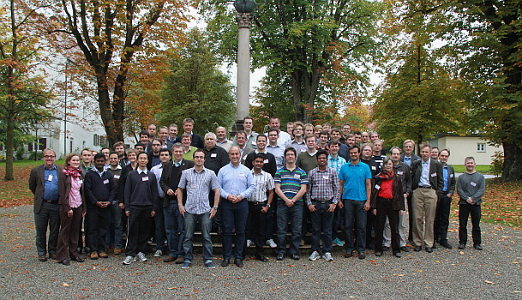
Doctoral Researcher Retreat, October 8-10, 2012
The 3rd InvasIC DRR took place in connection with the Annual Meeting 2012 in Kloster Irsee, Germany
Autumn of Code, September 25, 2012, KIT
In the Autumn of Code Meeting the current state of the works for the invasive compute platform was discussed along with the definition of next steps targeting the integration activities of the common demonstrator scenarios. These will comprise applications of robotics and scientific computing. The subprojects mainly concerned with these applications presented the scenarios in detail with focus on exploiting the invasive features of architectural, compiler and run-time support research. The integration of sub-project contributions on the ChipIT demonstrator platform will deliver the possibility to investigate invasive concepts on real hardware.
Systemsoftware/Architecture Working Group Workshop, September 17, 2012, FAU
Subjects of debate of the working group were the definition of common terms (here: application), granularity of invasion , and benchmarking of invasion (system-software basis for before/after scenarios).
Demonstrations Workshop, May 30, 2012, FAU
With more than 25 participants from all sub projects, the "Demonstration
Workshop" was a great success. Beside project-specific demonstrations,
also a first common demonstration scenario on the FPGA-based
prototyping platform was refined, which is an important step toward the
demonstration of the benefits of Invasive Computing across all project
areas.
Systemsoftware Working Group Workshop, May 11, 2012, FAU
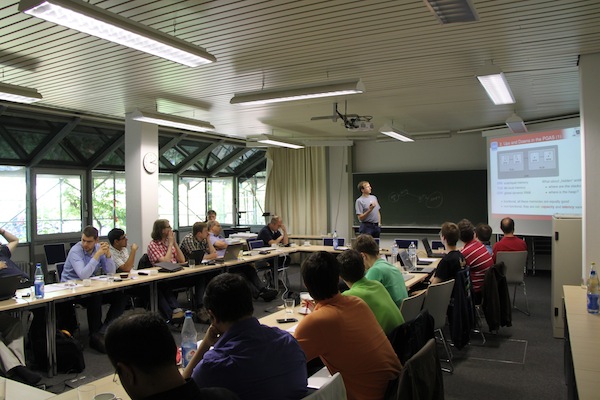
Subjects of debate of the working group were memory bandwidth, dynamic program memory (i.e., location of stacks and heaps), and benchmarking of invasion (before/after scenarios).
Doctoral Researcher Retreat 2012/I, February 15-17, 2012
This year the doctoral researchers gathered in Obertrubach to discuss further challenges on the way to the invasive SoC and to show up solutions. Among others, discussed topics included context switches on macro architectures, scalability on heterogenous systems, simulation components, operating system abstraction layers and TCPAs.
Semi-annual meeting 2012, February 13-14, 2012, FAU
51 scientists met at the semi-annual meeting of the TCRC 89 "Invasive Computing" 2012 in the Fraunhofer IISB in Erlangen. In short talks the status quo of subprojects and the three working groups (architecture,
languange and applications, system software) was summarised. The focus of the talks and the following discussions was on the projects’ perspective for the end of the first funding period in 2014.
Winter of Code 2012, January 20, 2012, TUM
At the InvasIC Winter of Code Workshop, researchers from all subprojects met to present the status of their work for validating and demonstrating Invasive Computing on the ChipIt platform. The implementation activities of the invasive architecture and system software as well as application scenarios have been discussed. As a result, near term milestones were defined to realize a first invasive computing platform until late summer of 2012.
Events 2011
Doctoral Researcher Retreat 2011, October 5-7, 2011, Lauterbad
The first SFB/TR 89 Invasive Computing Doctoral Researcher Retreat (DRR) was held as a continuation of the annual meeting from Oct. 5ñ7, 2011. The event was organized by five Nachwuchswissenschaftler, who participated together with 35 doctoral researchers. The motto of the first DRR was ìGet Together and Get to Knowî. It deliberately embeds a social and a factual facet of interaction; both of which were to be improved during the DRR in order to foster cross-subproject collaboration.
Annual Meeting 2011, October 3-4, 2011, Lauterbad
The Annual Meeting 2011 took place from October 3-4 in Lauterbad, Black Forest. 51 scientists from the SFB/TRR 89 met to review and discuss the progress made in the last year. In a short talks each subproject was presented with focus on the progress since the semi-annual meeting, scheduling of the next steps and the cooperation with other subprojects. Accordingly, the three working groups language and applications, system software and architectures gave an overview of the results of their last meetings. The last point of the agenda was the official meeting of the members of the SFB/TRR 89.
InvasIC Summer of Code Workshop, August 1-2, 2011, Karlsruhe
At the first InvasIC Summer of Code Workshop, 27 researchers from all project areas came
together and discussed common scenarios for the validation and demonstration of Invasive Computing.
Researchers from Z2 reported on the current status of the implementations on the FPGA systems
as well as first scalability studies were presented from the B projects. Together with the requirements of
the application projects, this resulted in a specification and a detailed road map for the
further development of a heterogeneous tiled architecture, which will be used by all projects
as a demonstration platform.
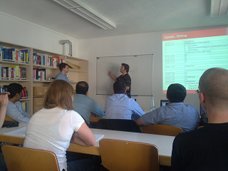
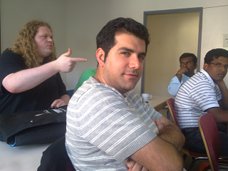
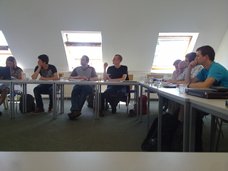
Language Working Group Workshop, July 4, 2011, Karlsruhe
With more than 30 participants, the first invasive language extension of X10 v0.1 was introduced by the Snelting group (Andreas Zinkau, project A1) which is realized as a library. After that Sascha Roloff from Erlangen explained the simulation interface for resource-aware programming in X10 (project C2). Both extensions have already been examined and tested for more than 10 code samples provided by individual projects before the workshop.Based on these two foundations, a first but big milestone was reached as a common basis within the Transregio for invasive programming and code application) development. For the future, it was decided also to investigate invasion strategies using the new language interface (project C1) as well as to implement and test monitoring functions project B4).
Systemsoftware Working Group Workshop, May 13, 2011, Munich
In the Systemsoftware Working Group Workshop in Munich researchers from different subprojects discussed
the InvasIC memory hierarchy. In the envisioned tiled architecture will be four different kinds of memory:
core internal memory, computer tile memory, memory tiles and off-chip memory.
In addition cache and the problem of cache coherence was debated.
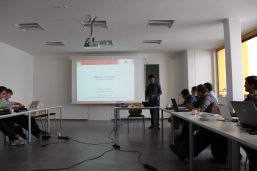
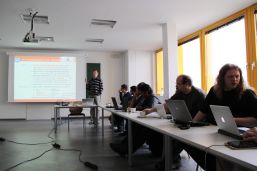
Semi-annual meeting 1/2011, February 14-15, 2011, Munich
The 2011 semi-annual meeting was used for a brief review of scientific research from all subprojects within the past half year. In brief presentations, the focus was on first results, milestones, cooperations with other subprojects
and ongoing or planned publications, followed by fruitfull discussions.
The working groups language and applications, system software and architectures gave an overview of the results of their first workshops and agreed upon needed cooperations
with subprojects and among each other.
The results were summarized describing further steps to be taken by the involved parties.
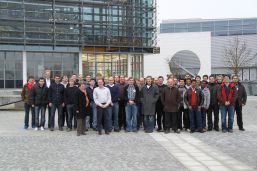
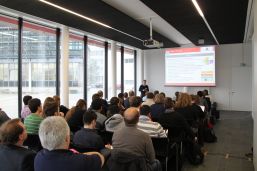
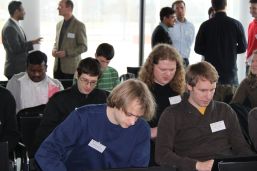
Architecture Working Group Workshop, January 19, 2011, Karlsruhe
At the meeting of all architecture subprojects topics concerning the hardware architecture e.g. memory hierarchy and interaction between hardware and invasic software mechanisms were discussed.
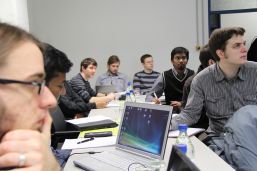
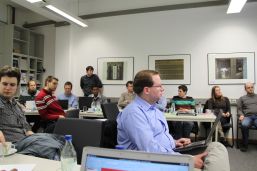
Events 2010
System Software Working Group Workshop, December 14, 2010, Erlangen
In this workshop some open questions from the language group workshop were discussed further by members of all subprojects. Also the application- and hardware developer addressed their needs to an invasive system software. The general terms and definitions of invasive constructs which are exchanged with the system software were refined.
Language Working Group Workshop, December 10, 2010, Karlsruhe
In the language group workshop at Karlsruhe the invasive language constructs were discussed. To get the different use and flavors of invasive programming every subproject presented several invasive pseudo-codes.
It was also discussed which invasive construct could be mapped to X10 constructs and which new language constructs have to be developed.
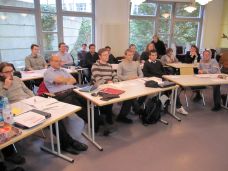
Annual plenary meeting 2010/2, September 15-16, 2010, Karlsruhe
The first plenary meeting with a scientific focus after the start of the project was used for an initial synchronization of all subprojects, a report of the work done so far and discussions about further directions.
In three sessions, the working groups "language and applications", "architectures", and "system software" gave an overview over the required cooperations within the groups and about required input and output from the other
project members. The results were summarized in a roadmap describing further steps to be taken by the involved parties.
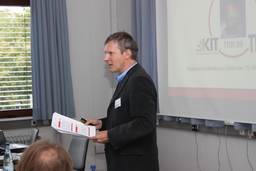
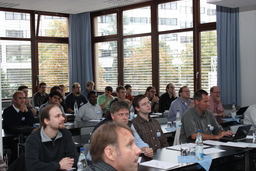
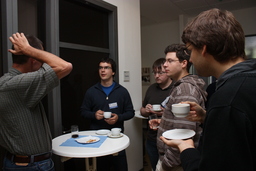
SFB/TRR 89 Inaugural meeting, June 28, 2010, Erlangen
Elections of the board of the TCRC:
Prof. Jürgen Teich (coordinator, site-coordinator Erlangen, coordinator project-area C), Prof. Jörg Henkel (vice-coordinator, site-coordinator Karlsruhe), Prof. Andreas Herkersdorf (vice-coordinator, site-coordinator
Munich, coordinator project-area B), Prof. Doris Schmitt-Landsiedel (vice-site-coordinator Munich), Prof. Wolfgang Schröder-Preikschat (vice-site-coordinator Erlangen), Prof. Gregor Snelting (vice-site-coordinator Karlsruhe,
coordinator project-area A), Prof. Michael Gerndt (coordinator project-area D)
DFG Establishes new CRC/Transregio, May 19, 2010
Press Release No. 24: DFG Establishes new CRC/Transregio (in German only)

